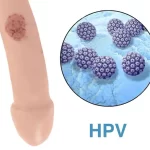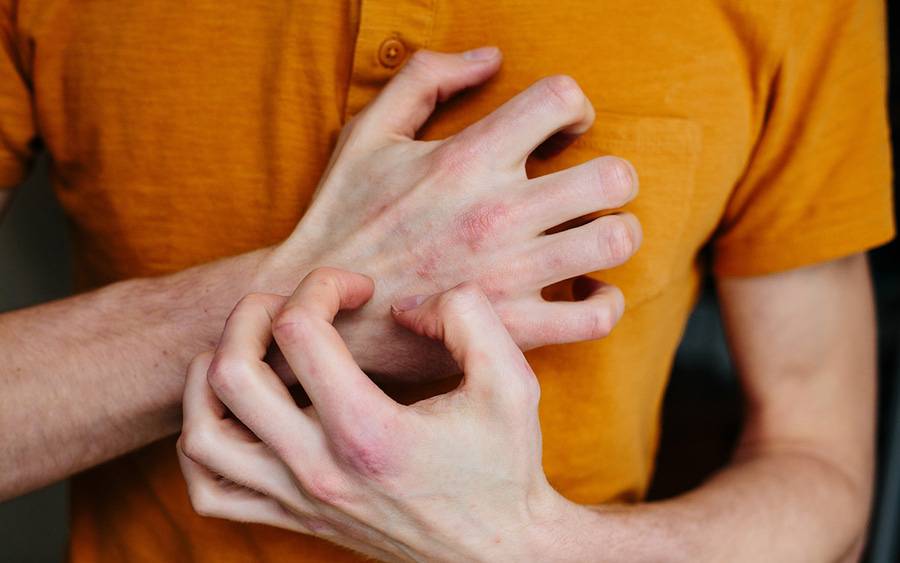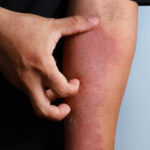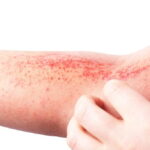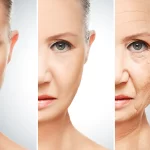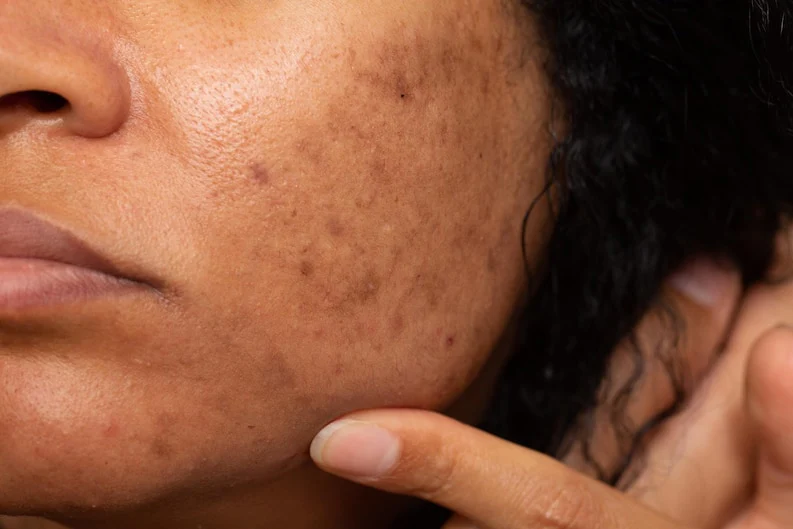Fact About Skin Rashes from Stress
On this article regarding skin rashes from stress, you’d discover the connection between stress and skin rashes. Learn how stress can trigger skin rashes, types of rashes, and effective ways to manage and treat them.
According to recent polls, Americans rank among the most stressed populations globally. Stress levels in the United States have been attributed to various factors, including work pressures, financial concerns, and political uncertainty.
While many people view stress primarily as an emotional experience, its effects can extend far beyond our mental state. Chronic stress can significantly impact our physical health, leading to a variety of symptoms and conditions.
Stress-Induced Physical Symptoms
Stress doesn’t only affect the mind; it has tangible effects on the body as well. Common physical symptoms of stress include high blood pressure, headaches, and fatigue. Another frequent manifestation of stress is skin rashes.
These rashes can vary in appearance and severity, but they often add to the discomfort and anxiety already caused by stress.
Appearance of Stress Rashes
Stress rashes typically appear as raised red bumps known as hives. These hives can occur anywhere on the body but are often found on the face, neck, chest, or arms. Hives can vary in size, ranging from small dots to large welts, and they may form in clusters.
The rashes can be extremely itchy and may also cause a burning or tingling sensation. The appearance of hives can be sudden, and they may disappear and reappear over time, adding to the frustration and discomfort.
The Stress-Skin Connection: How Stress Affects Your Skin
Stress is a natural response to life’s challenges, but chronic stress can have far-reaching consequences for our overall health, including our skin.
Skin rashes from stress are a common phenomenon, and understanding the connection between the two can help you take control of your skin’s health.
When we’re stressed, our bodies release hormones like cortisol and adrenaline. While these hormones are crucial for dealing with short-term stress, prolonged exposure can lead to significant disruptions in our skin’s function and appearance.
How Stress Triggers Skin Rashes
Stress triggers the release of hormones like cortisol and adrenaline, which can disrupt the skin’s natural balance. This disruption can lead to inflammation, increased blood flow, and changes in skin cell growth, resulting in skin rashes. Additionally, stress can:
- Weaken the skin’s natural barrier: This makes it easier for irritants and pathogens to penetrate the skin, leading to infections and rashes.
- Increase the production of sebum: Excess sebum can clog pores, leading to acne.
- Exacerbate existing skin conditions: Conditions such as eczema and psoriasis can flare up due to stress.
Types of Skin Rashes from Stress
Several types of skin rashes can be triggered or exacerbated by stress, including:
- Eczema (atopic dermatitis): Characterized by itchy, inflamed patches of skin.
- Psoriasis: Known for red, scaly plaques that can be itchy or painful.
- Acne: Stress can lead to breakouts of pimples and cysts.
- Rosacea: Stress can trigger redness and visible blood vessels in the face.
- Hives (urticaria): Raised, itchy welts that can appear suddenly.
- Heat rash (miliaria): Small red bumps caused by blocked sweat ducts.
- Contact dermatitis: Red, itchy rash caused by direct contact with an irritant or allergen.
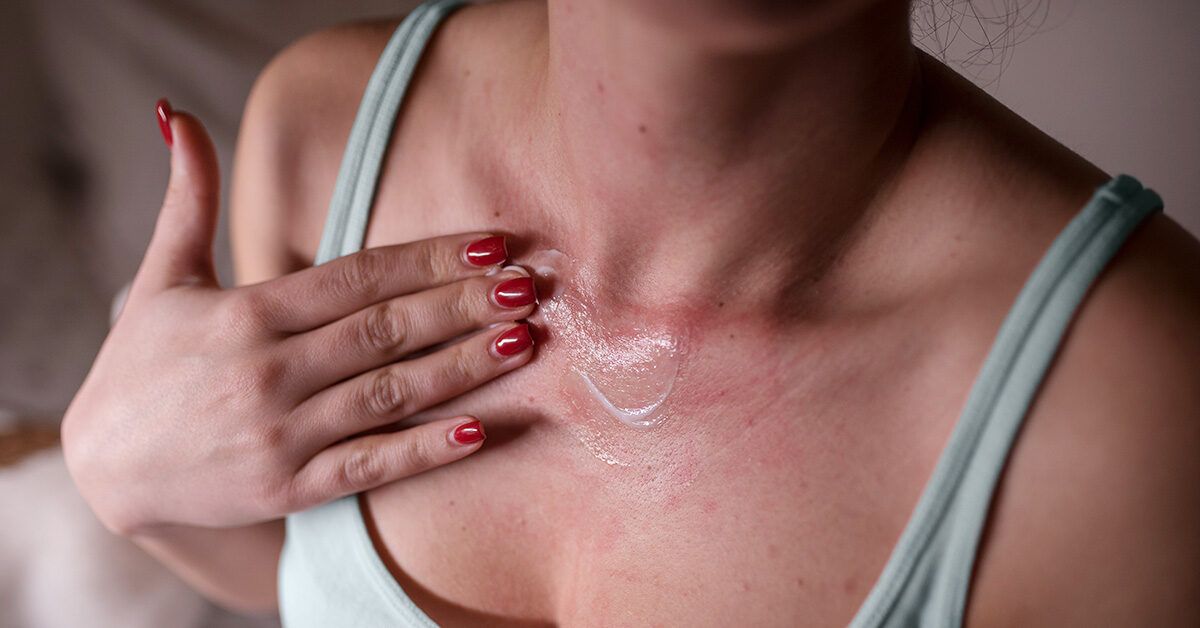
Symptoms and Characteristics
Skin rashes from stress can manifest in various ways, including:
- Redness and inflammation: A common sign of stress-induced rashes.
- Itching, burning, or stinging sensations: Often accompanies inflamed skin.
- Blisters, bumps, or patches: Can vary in appearance depending on the type of rash.
- Dry, scaly, or oozing skin: Particularly common in eczema and psoriasis.
- Location: Rashes can appear anywhere on the body, including the face, neck, arms, and legs.
Managing and Treating Skin Rashes from Stress
While stress is a common trigger for skin rashes, there are effective ways to manage and treat them:
- Stress management techniques: Practices like meditation, yoga, and deep breathing can reduce stress levels.
- Topical creams and ointments: Anti-inflammatory and anti-itch creams can provide relief.
- Oral antihistamines and corticosteroids: Used for more severe cases to reduce inflammation and itching.
- Lifestyle changes: Maintaining a healthy diet, staying hydrated, and getting enough sleep can improve overall skin health.
Natural Remedies
In addition to medical treatments, natural remedies can provide relief and support skin health:
- Aloe vera gel: Known for its soothing and calming properties.
- Oatmeal baths: Can reduce inflammation and relieve itching.
- Tea tree oil: Has antibacterial and anti-inflammatory properties that can help with acne and other skin issues.
- Coconut oil: Moisturizes and nourishes the skin, helping to restore its natural barrier.
Aloe Vera Gel: Known for Its Soothing and Calming Properties
Aloe vera gel is derived from the leaves of the aloe plant and has been used for centuries for its healing properties. It contains vitamins, minerals, enzymes, and amino acids that contribute to its therapeutic effects.
SEE ALSO: Nutritional Value of Walnuts
When applied to the skin, aloe vera gel provides a cooling sensation that helps to soothe irritation and reduce redness. Its anti-inflammatory properties make it particularly effective for treating skin rashes and burns.
Aloe vera also promotes wound healing by stimulating skin cell regeneration, making it a valuable natural remedy for various skin conditions, including those triggered by stress.
Oatmeal Baths: Can Reduce Inflammation and Relieve Itching
Oatmeal baths have long been a home remedy for soothing irritated skin. Colloidal oatmeal, which is finely ground oatmeal, can be added to bath water to create a milky solution that coats the skin.
This creates a protective barrier that locks in moisture and eases dryness. Oatmeal is rich in beta-glucan, a compound known for its anti-inflammatory and antioxidant properties. These properties help to reduce inflammation and itching associated with skin rashes.
Oatmeal baths can be particularly beneficial for conditions like eczema, psoriasis, and contact dermatitis, providing relief from the discomfort caused by stress-induced skin issues.
Tea Tree Oil: Has Antibacterial and Anti-Inflammatory Properties That Can Help with Acne and Other Skin Issues
Tea tree oil, extracted from the leaves of the Melaleuca alternifolia plant, is renowned for its potent antibacterial and anti-inflammatory properties. This essential oil can penetrate the skin to unblock sebaceous glands, disinfect pores, and dry out whiteheads, blackheads, and pimples.
Its ability to reduce inflammation and kill bacteria makes it an effective treatment for acne. Additionally, tea tree oil can be used to soothe other skin conditions exacerbated by stress, such as eczema and rosacea.
Diluted tea tree oil applied to the affected area can help reduce redness, swelling, and irritation, promoting clearer and healthier skin.
Coconut Oil: Moisturizes and Nourishes the Skin, Helping to Restore Its Natural Barrier
Coconut oil is a natural emollient known for its moisturizing and nourishing properties. Rich in fatty acids, including lauric acid, it helps to reinforce the skin’s natural lipid barrier, preventing moisture loss and keeping the skin hydrated.
Coconut oil also has antimicrobial properties that can help protect the skin from infections. Its soothing effect can alleviate dryness and flaking, often seen in conditions like eczema and psoriasis.
Regular application of coconut oil can improve skin texture and elasticity, making it an excellent natural remedy for maintaining healthy skin and addressing stress-induced skin issues.
Preventing Stress Rash
Stress is the body’s natural response to situations that feel overwhelming or create anxiety. If you develop a stress rash, it may be a signal that you need to address and reduce sources of stress in your life, whether they are related to your job, relationships, finances, or other factors.
Even if you cannot change your circumstances, you can learn to manage how you react to stressful triggers. Gaining more control over stress in your life may lead to fewer or milder rashes.
Here are some tips to help manage stress:
- Engage in Physical Activity: Exercise, yoga, tai chi, or meditation can help reduce stress levels and improve overall well-being.
- Socialize: Spend time with friends, whether it’s going for a walk or having coffee, to help distract and reduce stress.
- Enjoy Family Time: Engage in fun activities with your family to relax and strengthen bonds.
- Listen to Music or Read: Music and reading can be excellent ways to unwind and take your mind off stressful thoughts.
- Immerse in Audiobooks or Podcasts: These can be a great distraction and a source of enjoyment during stressful times.
Identifying the Cause of the Rash
Sometimes, what appears to be a stress rash may actually be caused by something else, such as eczema or insect bites. Another possibility is contact dermatitis, a rash caused by contact with an allergen, such as certain chemicals or fabrics.
If you experience frequent rashes, it’s advisable to see your doctor. Together, you can determine the underlying cause and develop a plan to reduce outbreaks and manage your skin health effectively.
Conclusion
Skin rashes from stress are a common and treatable condition. By understanding the connection between stress and skin health, you can take proactive steps to manage stress, prevent skin rashes, and maintain healthy, glowing skin.
Remember, a healthy skin-scape is a reflection of a healthy mind and body.
Taking care of your mental health is as important as taking care of your physical health, and by managing stress effectively, you can improve your overall well-being and skin health.

A graduate of Computer Science and Information Management Technology. Diploma – Caregiving, Certificates – Dementia and Diabetes Awareness and Management. A researcher, blogger, songwriter, singer and acoustic guitarist. Born in an environment where natural talents such as healing are imparted at our natural birth. This natural talents of healing is the result of our genetic inheritance and the training from family environment.







